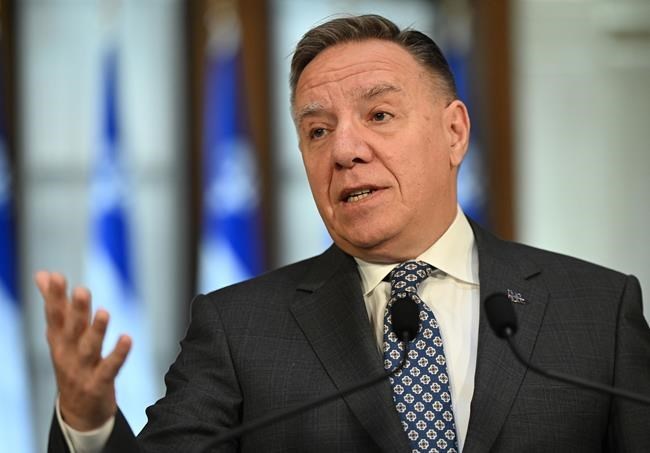MONTREAL — Quebec Premier François Legault is maintaining that the province cannot accept more than 50,000 immigrants a year despite Ottawa's plans to significantly raise the country's immigration levels.
The federal government, Legault told reporters Wednesday, needs to understand that Quebec is facing a "special challenge" to preserve the French language.
His comments were in reaction to Ottawa's announcement on Tuesday that it intends to welcome about 500,000 annual newcomers to Canada by 2025. By comparison, the federal Immigration Department said 405,000 permanent residents were admitted last year.
"Already at 400,000 there was a problem, so at 500,000 it's even more so," Legault said. “Already at 50,000 it is difficult to stop the decline of French."
Prime Minister Justin Trudeau said Wednesday that immigration done correctly can help address labour shortages in Quebec and that Ottawa would be there to help the province create more economic growth.
"Quebec has long had the ability to increase its immigration thresholds," Trudeau told reporters. "I know that every time I speak to business owners in Montreal or in the regions, they emphasize how important it is to counter the worker shortage."
Quebec's immigration agreement with Ottawa permits the province to welcome a percentage of newcomers equal to its demographic weight in the country — 23 per cent — which would be about 115,000 people should Canada accept 500,000 immigrants a year.
The highest number of annual immigrants the province can properly integrate is 50,000, Legault said, adding that even the most ambitious plan presented by a political party during the recent provincial election set a maximum target of 80,000 newcomers.
Later on Wednesday, Quebec Immigration Minister Christine Fréchette said the province's 50,000 number was firm.
"That will not change, no matter how many immigrants arrive elsewhere in Canada," she told reporters.
Fréchette said she spoke with federal Immigration Minister Sean Fraser last week and reiterated the province's position on wanting more powers from Ottawa over immigration; she said those discussions will continue.
"We will use all the levers at our disposal to attain the maximum percentage of immigrants who are francophone; this is essential for the sustainability of French," Fréchette said. The province's immigration target is based on its ability to teach newcomers French, Fréchette said, adding that welcoming more people would aggravate the housing shortage.
Asked whether Quebec risked losing influence should its demographic weight decline, Fréchette said the province is relying on Trudeau's commitment to maintain Quebec's political clout within Canada.
On Tuesday, a major employers group in Quebec called on Legault to reconsider his immigration targets. The Conseil du patronat du Québec also asked Ottawa to cut immigrant application processing times and to attain federal targets of having 4.4 per cent of immigrants to Canada — outside Quebec — being francophone.
"While all the other provinces will benefit from (a rise in immigration), Quebec must give more consideration to this avenue to address the labour shortage and slow the decline in our demographic weight in Canada," Denis Hamel, vice-president of the Conseil du patronat, said in a statement.
This report by The Canadian Press was first published Nov. 2, 2022.
Sidhartha Banerjee, The Canadian Press


